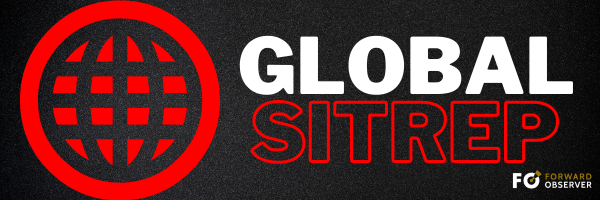Good morning, and welcome to the Global Situation Report for Friday, 26 April 2024.
- AMLO IN TALKS WITH CARTELS ON SOUTHERN BORDER: Mexican President Andres Manuel Lopez Obrador (AMLO) said he was in talks with violent cartels operating in Mexico’s southern states in order to negotiate an end to the violence. “We have sought to reach arrangements,” AMLO said without providing details.
- AMLO also said that he has met with civilian self-defense groups, referred to as autodefensas, calling them “strange people, but respectful.” He reiterated that “violence cannot be confronted with violence” between the cartels and self-defense groups.
Why It Matters: Earlier this week, presidential candidate Claudia Sheinbuam was held up by masked gunmen while traveling through Chiapas. The group was allegedly an armed autodefensas group, which started a minor national controversy. Meanwhile, AMLO famously campaigned on and implemented a “hugs, not bullets” strategy to defeat the cartels, which has been a massive failure as Mexico’s homicide rates soar. Chiapas, the state in which Sheinbaum was stopped, has been described as being in a state of “civil war” among self-defense groups and various cartels. Cartel violence remains one of several limiting factors in Mexico’s ability to near-shore manufacturing closer to the United States, especially in the south, where Sheinbaum has proposed building factories to provide economic opportunity. Sheinbaum is likely to be the next president and is not expected to change the national cartel strategy. – M.S.
- SHOIGU: RUSSIA, ALLIES SHOULD INCREASE EXERCISES IN ASIA: Speaking at a Shanghai Cooperation Organization (SCO) defense ministers meeting, Russian defense minister Sergei Shoigu urged SCO members to step up military exercises in Asia to combat increased U.S. interest in the region.
- “Washington has stepped up activities to regain its positions in Central and South Asia, lost after the withdrawal of coalition troops” from Afghanistan, Shoigu said. “[T]he deployment of military infrastructure in the region by the United States and its allies is unacceptable. Such intentions must be regarded as a direct threat to stability.” Shoigu added that the United States intends to “provoke color revolutions and crises in member states.”
- The SCO includes member states China, India, Iran, Kazakhstan, Kyrgyzstan, Pakistan, Russia, Tajikistan, and Uzbekistan.
Why It Matters: Chinese and Russian officials have for years warned Central Asian countries about the potential for color revolutions instigated by U.S. and Western organizations. They are not wrong. Indeed, the U.S. State Department and U.S.-backed non-governmental organizations (NGOs) have increased their interest and activity across Central Asia and the South Caucasus following the Russian invasion of Ukraine in order to weaken Russia’s sphere of influence in the region. Armenia’s suspension of its participation in Russia’s Collective Security Treaty Organization (CSTO) and pivot towards increased Western relations is one such example of Western success. Russia and China are likely to not only increase joint military exercises in Central Asia and Asia-Pacific but are also likely to offer increased security assistance to countries at risk of U.S.-backed color revolutions. On a related note, Russian Security Council Secretary Nikolai Petrushev held talks with officials from Venezuela and Nicaragua this week. Topics included defense against U.S.-backed color revolutions. – M.S.
- XI GIVES ORDERS TO THE U.S. SECRETARY OF STATE: Chinese President Xi Jinping met with U.S. Secretary of State Antony Blinken on Blinken’s final day in China.
- Xi urged the U.S. diplomat to “seek common ground, be true to words and resolute in deeds.”
- Xi also told Blinken that the United States needs to strengthen dialogue, manage differences, and promote cooperation as the world goes through “profound changes.”
Why It Matters: Reporting on this indicates that Blinken was given very little opportunity to represent the U.S. to the foreign leader and instead was given orders for what the U.S. needed to do for China. Xi’s second statement is effectively telling the United States to conduct a peaceful transition out of hegemony and into a multipolar world. Xi’s and China’s continual accusations of the U.S. and all diplomatic adversaries not keeping their word is another play to degrade the U.S.’ reputation on the world stage. This meeting appears fruitless and will likely harm relations in the long term. – J.V.
- Global Rollup
- French officials say they could begin talks with the Philippines over a status of forces agreement for visiting military units between the two countries.
- U.S. National Security Advisor Dan Sullivan told reporters that the “defense industry is still underestimating” global demand for munitions in the years to come.
- The defense committee of Sweden’s national legislature recommended the country increase defense spending and expand its number of military conscripts, adding that a military attack by Russia “cannot be ruled out.” Norway announced earlier this month that it would expand its military conscription by roughly 30%.
- The U.S. Army announced the withdrawal of at least some U.S. troops from Chad following a Chadian order for U.S. troops to halt their activities. U.S. defense officials say the special operations troops will redeploy to Germany while they are away 06 May elections in Chad.
- India’s external affairs ministry said they’re keeping a “close watch” on the first-ever China-Bangladesh joint military exercise. Bangladesh sits on India’s eastern border.
THAT’S A WRAP: This does it for today’s edition. Thank you for reading. If you know folks who would also like to receive this email, would you please forward it to them? We appreciate you spreading the word. – M.S.

